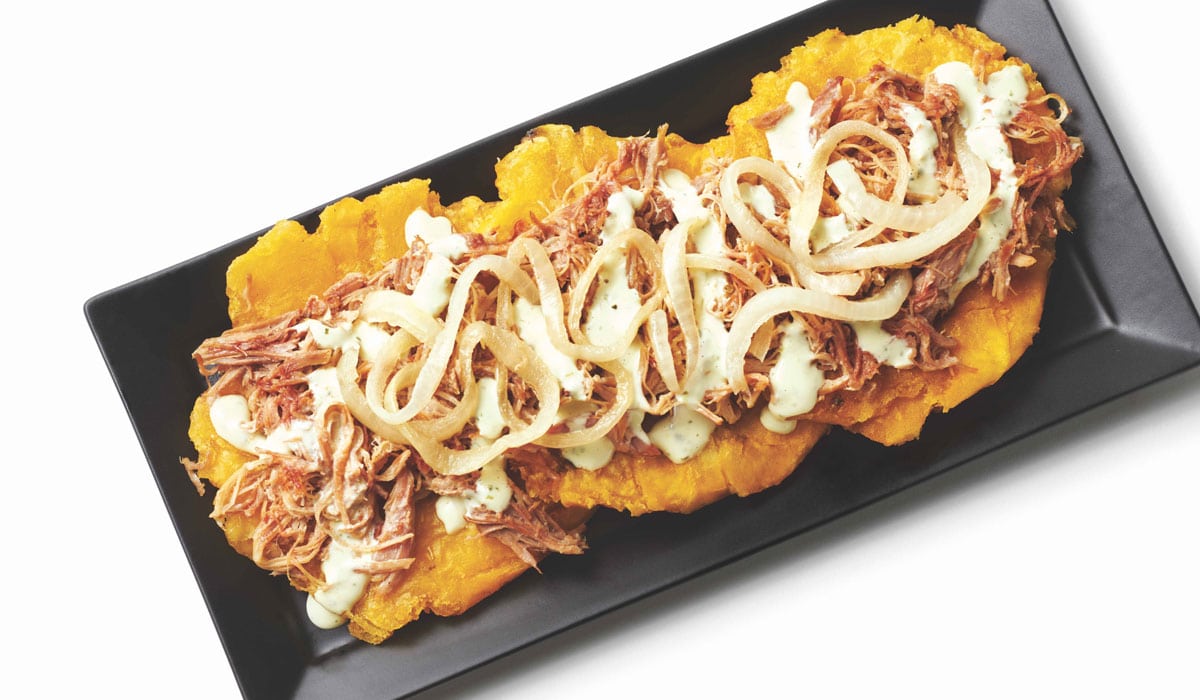In the wake of Fiesta Restaurant Group revealing in early June that it’s selling Taco Cabana for $85 million, it’s clear that change is coming.
The nearly 150-unit taco chain will soon belong to Yadav Enterprises, a 400-store franchisee that operates Jack in the Box, Denny’s, El Pollo Loco, and Corner Bakery Cafe. The transaction is expected to close in Q3.
Fiesta has promised the sale will allow it to pay off its term loan balance, as well as invest in remodeling, digital platform acceleration, and unit growth for its remaining brand, Pollo Tropical.
“We made the strategic decision to sell the Taco Cabana business to allow our leadership team to focus completely on accelerating Pollo growth, and we are very excited about the tremendous expansion opportunities we have for the Pollo Tropical business,” Fiesta CEO Richard Stockinger said during an earnings call Thursday.
The 167-unit Pollo completed its first remodel in Q2 with strong initial customer feedback. The unit redesign updates color schemes, decreases dining room seats, and optimizes lines to improve speed of service.
In terms of off-premises growth, the chicken chain plans to enhance its digital platform—in usability and speed—with better drive-thru experiences and curbside geo-fencing technology enhancements. More specifically, Pollo intends to use faster payment devices to reduce its estimated processing speed from 25 seconds to less than 5 seconds per transaction. The brand will also leverage QR codes to create a kiosk-enhanced digital drive-thru experience.
Pollo will pilot the upgraded digital drive-thru platform in select units later this year. In Q2, drive-thru grew 18 percent, while delivery and online channel sales jumped at least 80 percent compared to 2020.
“We’re very excited about the capabilities for improved order accuracy, speed of service, greater level of personalized marketing, and additional opportunities to showcase our unique brand attributes that this platform will enable,” Chief Experience Officer Patricia Lopez-Calleja said. “In addition to creating a stable and scalable environment and increased order value, the MVP [minimum viable product] targeted for the first phase of the digital drive-thru transformation will give us more insights into who our guests are and how they use this channel.”
With so few staff, Fiesta’s state-of-the-art curbside system has not been fully implemented. But Pollo still made good progress offsetting the loss of dine-in sales, traditionally around 25 percent, with off-premises and drive-thru sales growth.
An improved loyalty program will stimulate sales, too.
“We continue to iterate on what and how we communicate with our loyalty members through our app, leveraging insights to provide more personalized and relevant conversations,” Lopez-Calleja said. “We see our mobile applications and the future drive-thru experience as the core components of our digital platform, which will allow for enhanced innovation going forward.”
[image source_ID=”127738″]
Although Fiesta is moving forward with these digital initiatives, the onslaught of staffing shortages continue to stall sales growth.
Pollo didn’t quite reach 2019 comparable restaurant sales levels in the second quarter. The chain’s same-store sales jumped 43.5 percent in Q2 compared to 2020, but decreased 1.8 percent compared to 2019. Meanwhile, Taco’s same-store sales grew 15.6 percent from 2020 in Q2, and dropped 6.7 percent versus 2019.
Dine-in and counter takeout same-store sales rose 117 percent in Q2 year-over-year. Compared to the first quarter, counter sales increased 7.2 percent, while drive-thru sales jumped 0.6 percent and online channels lifted 2.9 percent. Delivery continued to exceed 10 percent of sales, while dine-in’s mix grew to 6 percent, still below 2019 levels.
With the labor shortage still hurting business, Fiesta looked to resolve the dilemma by temporarily increasing wages by $1—an initiative that began in May and will likely continue through August. The brand also provided incentives for managers, streamlined recruiting processes, and boosted Pollo’s minimum wage to $10 per hour, or $11 per hour with the temporary $1 increase.
READ MORE: Pollo Tropical Parent Implements Temporary Wage Increase
But that might not be enough.
“Despite those efforts, staff availability issues intensified in the second quarter and had an increasingly negative impact on sales throughout the quarter,” Stockinger said.
Because of staffing challenges, Fiesta reduced operating hours by around 4 percent across all channels for the quarter. And even more, the company temporarily closed dining rooms and postponed delivery and online ordering. This allowed team members to focus on drive-thru and counter takeout sales, a predominant way of ordering throughout the pandemic.
Staffing levels gradually improved with these initiatives. However, Fiesta still searches for ways to get back to a healthy, thriving employee base.
“We continue to challenge our recruiting resources and processes, including the addition of additional resources dedicated to specific geographics that are currently experiencing greater issues as well as sign-on bonuses for hourly and management new hires,” Stockinger said.
Fiesta’s restaurant wages as a percentage of net sales increased from 23.9 percent in the second quarter of 2020 to 24.1 percent in 2021.
To improve margins, Fiesta, like many companies, continues to explore additional price increases. In April, the company increased prices by 3 percent. Fiesta CFO Dirk Montgomery believes it is possible for Fiesta to offset the cost impact of increased wages through these price hikes and still appeal to customers.
“Based on the research that we’ve done, we believe that there is a relatively low sensitivity in that channel to price increases,” said Montgomery, regarding delivery.
“With the increased wages and the increase of retention and the increased recruitment efforts that we’re making, we believe that we’re going to be able to bring more people on board or back that should increase the sales, which of course is margins and transactions,” Stockinger added.
Fiesta increased operations revenues by 43.7 percent to $91.2 million in Q2 from $63.4 million in 2020.







